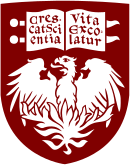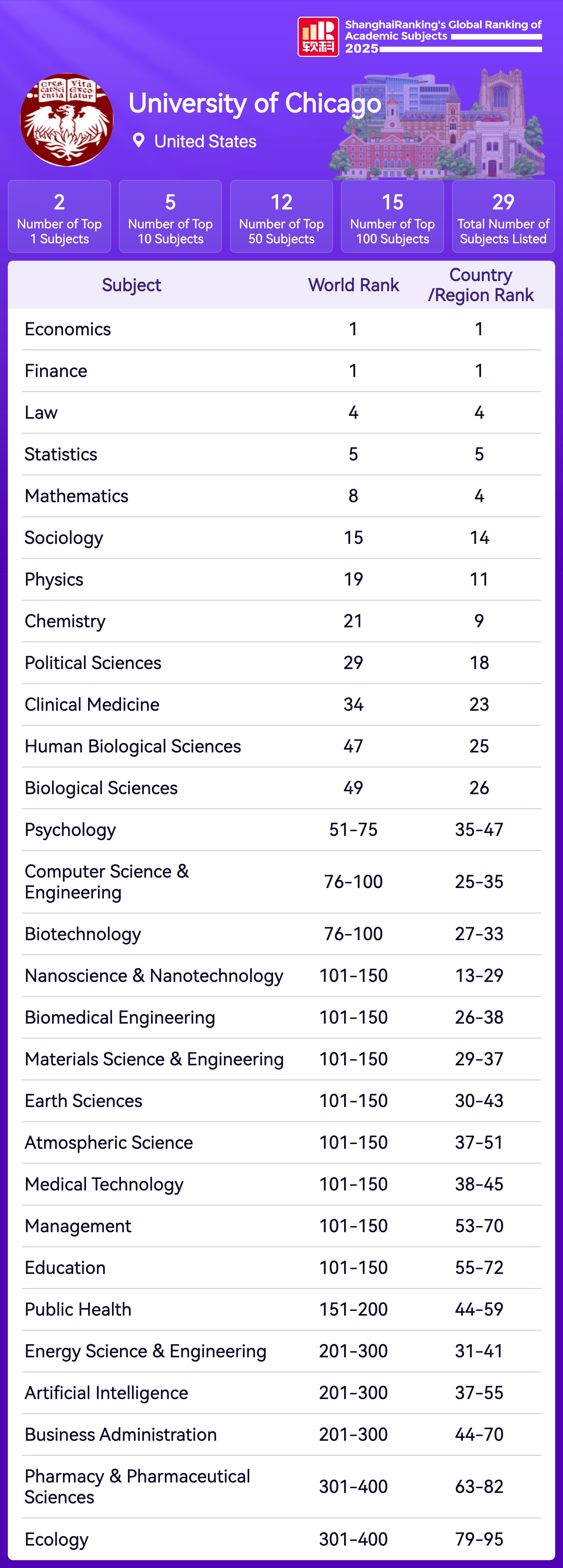 10
10 


The University of Chicago is a private urban research university that has driven new ways of thinking since 1890. It utilizes a quarter-based academic calendar, which runs from late September until early June. The University of Chicago is located in the historic, residential neighborhood of Hyde Park, just 20 minutes south of downtown Chicago. Our 217 acre campus offers a rich student life experience in a big-city setting. The main campus is also a certified botanic garden. The University of Chicago comprises of the undergraduate College, four graduate divisions, and professional schools including the highly ranked Booth School of Business, Pritzker School of Medicine, Harris School of Public Policy Studies, Pritzker School of Molecular Engineering, Graham School of Continuing Liberal and Professional Studies, Law School, School of Social Service Administration, and Divinity School, as well as a top graduate program in the Kenneth C. Griffin Department of Economics. The University is recognized for its devotion to open and rigorous inquiry. UChicago prides itself on the strength of its intellectual traditions, including a dedication to intense critical analysis and lively debate, all of which result in creative solutions to complex problems. The University has been home to 92 Nobel Prize winners, over 260 Guggenheim fellows, over 50 Macarthur "genius" fellows, and 25 Pulitzer Prize-winners. Famous alumni include former U.S. Attorney General John Ashcroft, Nobel Laureate Milton Friedman, former Senior Advisor to President Obama David Axelrod, former U.S. Supreme Court Justice John Paul Stevens, and author Kurt Vonnegut Jr. Academic Experience: UChicago is renowned for the unparalleled resources it provides its undergraduate students. The University maintains a student-faculty ratio of 5:1, ensuring that every undergraduate classroom experience exemplifies our commitment to close interactions between students and faculty in small, discussion-style seminars. Our famous Core curriculum—courses in eight subject areas that all students, regardless of their major, are required to take—provides students with a common vocabulary and a well-balanced academic experience, while allowing them the flexibility to explore their own particular interests. Students and professors are encouraged to engage in substantive debates and conversations, which promotes a culture of intellectual discourse. The College offers over 50 majors of programmatic study in well-defined fields such as anthropology and mathematics, to interdisciplinary programs, like biological chemistry and comparative literature, as well as pre-professional courses of study. Beyond the classroom, students enjoy a vibrant and diverse environment with over 400 registered student organizations and dozens of intramural, recreational, or varsity sports programs. The UChicago Maroons have 19 NCAA Division III teams, which compete in the University Athletic Association. First- and second-year undergraduates are required to live on campus, while others live in off-campus apartments. Students are placed in "houses" within their residence hall, which serve as tight-knit communities and provide academic and social support. Students also enjoy forty student theatrical productions a year, a rich music and arts scene, and celebrations of different cultures and communities. Career Services: The Office of Career Advancement empowers undergraduates of all interests and backgrounds to apply their world-class education to a fulfilling career through individual meetings with personalized support. Over 3,000 Metcalf internships—fully funded opportunities across a range of industries — are available for UChicago students each year in cities across nearly 50 countries. Financial Aid: The University’s Financial Aid program No Barriers is a comprehensive plan created to increase access to college, support students as they receive an empowering education, and prepare them for lifelong professional success. Families who apply for financial aid do not have to pay a college application fee to UChicago. UChicago’s need-based financial aid involves no loans and is awarded as grants, which do not need to be repaid. Study Abroad: UChicago Study Abroad encourages students to expand their education through diverse intellectual perspectives, active participation in a new culture, and first-hand engagement with local and global challenges. UChicago's distinctive range of faculty-led programming blends the spirit of intellectual curiosity that is central to the College curriculum with the University's wide-reaching international mission. The University also has a strong global presence with its own facilities in Beijing, Delhi, Hong Kong, London, and Paris and active educational programs in locations throughout the world. Through quarter-long, academic year and summer programs, UChicago students gain cultural fluency and hone language skills while either studying a civilization at its center or focusing on a particular academic theme. Faculty-designed excursions promote dynamic engagement beyond the classroom as the city and surroundings become the unofficial “second classroom” of each sequence. Participants remain registered in the College -- receiving academic credit and retaining financial aid eligibility -- making Study Abroad a fully integrated component of UChicago’s undergraduate education. Research: Research is an integral part of the study-curriculum at the University of Chicago. The University is a global leader in scientific advancement and plays a pivotal role as a central hub for innovation in quantum science and engineering. The University operates two major national laboratories, an internationally renowned medical center, and the nation’s largest academic press. Our campus contains six libraries with over 11 million print volumes and over 160 research centers and institutes. Notable research breakthroughs achieved by students and staff at the University of Chicago include: James Watson, the UChicago alumnus who shared the 1962 Nobel Prize for discovering the structure of DNA, launched the Human Genome Project in 1990. Today, University of Chicago scientists are building on Watson’s achievements, and reshaping our understanding of gene function and the role genes play in disease causation. Paleontologist Paul Sereno has discovered many previously unknown species of dinosaurs. Subrahmanyan Chandrasekhar, who first proposed the existence of “black holes” in the universe, won the Nobel Prize in Physics in 1983 “for his theoretical studies of the physical processes of importance to the structure and evolution of the stars.” Bruce Lahn and Wen-Hsiung Li explored differences in DNA sequence and gene expression between organisms to identify genes or gene regulatory elements that distinguish humans from lower primates or that correlate with specific behaviors, traits, or biological mechanisms.
 10
10 
| Subject | Rank |
|---|---|
Economics | 1 |
Finance | 1 |
Law | 4 |
Statistics | 5 |
Mathematics | 8 |
Sociology | 15 |
Physics | 19 |
Chemistry | 21 |


| Undergraduate Programs |
|---|
Anthropology |
Art History |
Biological Chemistry |
Biological Sciences |
Chemistry |
Cinema and Media Studies |
Civilization Studies |
Classical Studies |
Comparative Human Development |
Comparative Literature |
Comparative Race and Ethnic Studies |
Computer Science |
Early Christian Literature |
East Asian Languages and Civilizations |
Economics |
English Language and Literature |
Environmental Studies |
Fundamentals Issues and Texts |
Gender Studies |
Geographical Studies |
Geophysical Sciences |
Germanic Studies |
History |
History, Philosophy, and Social Studies of Science and Medicine |
Humanities |
Interdisciplinary Studies in the Humanities |
International Studies |
Jewish Studies |
Latin American Studies |
Law, Letters, and Society |
Linguistics |
Mathematics |
Medieval Studies |
Music |
Natural Sciences |
Near Eastern Languages and Civilizations |
Philosophy |
Physical Sciences |
Physics |
Political Science |
Psychology |
Public Policy Studies |
Religion and the Humanities |
Religious Studies |
Romance Languages and Literatures |
Russian Studies |
Slavic Languages and Literatures |
Social Sciences |
Sociology |
South Asian Languages and Civilizations |
Statistics |
Theater and Performance Studies |
Tutorial Studies |
Visual Arts |
| Graduate Programs |
|---|
African and African-American Studies |
Anatomy |
Ancient Mediterranean World |
Anthropology |
Archeological Studies |
Art |
Astronomy and Astrophysics |
Biochemistry and Molecular Biology |
Business School |
Cancer Biology |
Carribean Studies |
Cell Physiology |
Chemistry |
Cinema and Media Studies |
Classical Languages and Literatures |
Comparative Literature |
Computer Science |
Computer Science, Divisional M.S.Program |
Conceptual and Historical Studies of Science |
Continuing Education |
Developmental Biology |
Divinity School |
East Asian Languages and Civilizations |
East Asian Studies |
East European and Russian/Eurasian Studies |
Ecology and Evolution |
Economics |
Education |
English |
Evolutionary Biology |
Financial Mathematics, M.S. Program in |
Fine Arts |
Gender Studies |
General Studies in the Humanities |
Genetics |
Geographical Studies |
Geophysical Sciences |
Germanic Studies |
Graham School of General Studies |
Health Studies |
History |
History of Culture |
History of Religion |
History of Science and Medicine |
Human Development |
Human Nutrition |
Humanities, Master of Arts Program |
Immunology |
International Relations |
International Studies |
Jewish Studies |
Latin American Studies |
Law School |
Linguistics |
Mathematics |
Medical Physics |
Medical School |
Medieval Studies |
Middle Eastern Studies |
Molecular Biology |
Molecular Genetics and Cell Biology |
Music |
Near Eastern Languages and Civilizations |
Neurobiology |
Neurobiology, Pharmacology, and Physiology |
New Testament and Early Christian Literature |
Nutritional Biology |
Ophthalmology and Visual Science |
Organismal Biology and Anatomy |
Pathology |
Pharmacological and Physiological Sciences |
Philosophy |
Physical Sciences, Divisional Master's Program |
Physics |
Political Science |
Psychology |
Psychology and Sociology of Religion |
Public Policy Studies, School of |
Radiology |
Religion and Literature |
Romance Languages and Literatures |
Russian/Eurasian Studies |
Slavic Languages and Literatures |
Social Sciences, Master of Arts Program in |
Social Service Administration, School of |
Social Thought |
Sociology |
South Asia Language and Area Center |
South Asian Languages and Civilizations |
Statistics |
Theology |
Virology |
Visual Arts |
Workshops in the Humanities and Social Sciences |